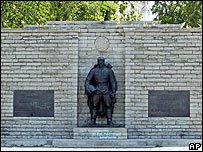
A] This derogatory Spanish term for a white English-speaking person does indeed have interesting stories linked to it, the one you mention probably being the most common, though most versions of the tale name the song as Green Grow the Rushes, O. Some tellers prefer to associate the song with Irish volunteers serving in Simon Bolivar’s army in the early 19th century, or to American troops attempting to track down Pancho Villa in Mexico in 1916-17, all of whom were supposedly singing from the same song sheet (the last of these often mentions Black Jack Pershing, since to attach a famous name to a story improves its credibility no end). Other tales link gringo with the green uniforms (hence green coats) that were worn by American troops of the period, who might have been urged by the locals “green go home”.
The real story is rather more interesting, since it takes us to two continents and involves four languages. A medieval Latin proverb referred to something unintelligible: Graecum est; non potest legi (“It is Greek; it cannot be read”). Shakespeare borrowed it in Julius Caesar: “Those that understood him smiled at one another and shook their heads; but for mine own part, it was Greek to me.” It’s the origin of our modern saying “it’s all Greek to me”.
The Spanish version of this Latin proverb was hablar en griego, literally to talk in Greek, and hence to speak unintelligibly. This was known in Spain no later than the last decades of the eighteenth century. Esteban de Terreros explained in his dictionary of 1787, El Diccionario Castellano, that “gringos llaman en Málaga a los estranjeros, que tienen cierta especie de acento, que los priva de una locución fácil y natural castellana; y en Madrid dan el mismo, y por la misma causa con particularidad a los Irlandeses” (“Foreigners in Malaga are called gringos, who have certain kinds of accent that prevent them from speaking Spanish with an easy and natural locution; and in Madrid they give this name to the Irish in particular for the same reason”). He explained that gringo was a phonetic alteration of griego.
The first recorded use of the word in English is in 1849, which does rather suggest it was the Mexican War that brought it to the attention of Americans. It appears in the diary of John Woodhouse Audubon, the son of the wildlife illustrator, who recorded on 13 June in that year that “We were hooted and shouted at as we passed through, and called ‘Gringoes’”. As his diary wasn’t published until 1906, public notice of the word in America more probably first came about through a book by one Lieutenant Wise of the US Navy that appeared in January 1850: Los Gringos; or, an inside View of Mexico and California, with Wanderings in Peru, Chili, and Polynesia.
Here's the article. Notice the new link in "For Your Amusement" on your right entitled World Wide Words.

1 comment:
One of the best and well researcher explaination for the origins of gringo I found. Thanks
Post a Comment